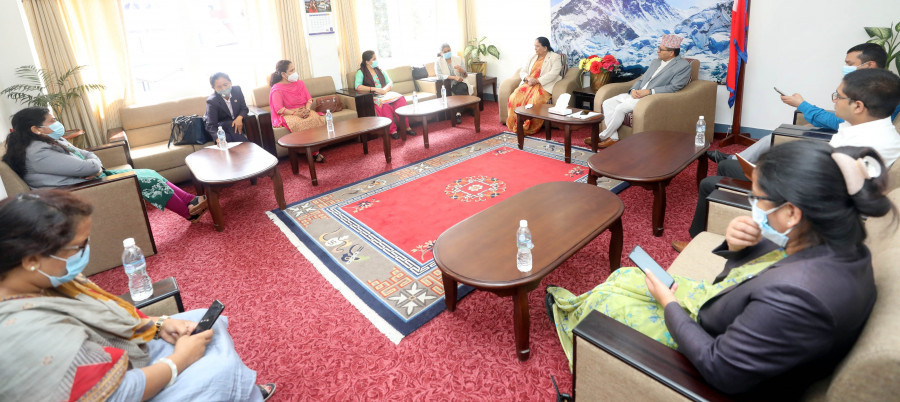National
Ordinance amends law on rape but fails to recognise rape of boy child and sexual minorities
Provision to legally recognise rape of only a woman or a girl child retained despite authorities wanting to change that provision to ‘person’. That could have had other implications.
Binod Ghimire
Ajita Bhujel, 29, a transwoman, was raped and murdered in Hetauda on January 18, 2020. Four persons were arrested but the police couldn’t book them on charges of rape as the existing law recognises the rape only of a girl or a woman.
“The four were sentenced only under murder charges,” said Pinky Gurung, chairperson of the Blue Diamond Society which advocates the rights of the sexual minorities. “We ask the government to revise the rape provisions in the criminal code after broad consultations.”
On Sunday President Bidya Devi Bhandari authenticated an ordinance published in the Nepal Gazette, the draft of which according to news reports had a provision which replaced “woman or girl child” of Clause 221 of the Criminal Code 2017 with “person” implying that both women or men could be raped.
“The provision was withdrawn after assessing that broader consultations are needed before redefining rape as it can have long-term implications,” Phanindra Gautam, spokesperson for the Ministry of Law and Justice, told the Post.
Women’s rights activists had criticised the draft ordinance saying it wasn’t empathetic towards the plight of the victims. They said that having a provision saying even men could be victims of rape could could further weaken the women rape victims’ fight for justice.
The ordinance had, following pressure from women lawmakers, revised existing laws to increase the penalty in the rape cases and, more importantly, book mediators who settle rape cases outside courts.
The ordinance, which has been enforced since Sunday, has provisions of six months to three years of jail term and a fine of Rs 30,000 for those who mediate to settle the rape case outside the court. Even those inciting mediation and putting pressure for out of court settlement for rape cases can face criminal charges.
If the victim is between 14 and 16 years old, the jail term has been increased to 12-16 years from the existing 12-14 years. If the victim is between 16 and 18 years old, the rapist can get 10-14 years jail term instead of 10-12 years. Similarly, if the victim is above 18 years, the perpetrator will be sentenced to 10-12 years in jail instead of the previous provision of 7-10 years.
There are no changes in the sentences for those raping a child below the age of 14. As per existing provisions, raping a child between 10 and 14 years will get 14-16 years of jail sentence while raping a child under 10 years will get 16-20 years in jail.
By the time the Cabinet endorsed the ordinance on November 22, according to officials at the Ministry of Law and Justice, any change in provisions on who could be raped had been left unaltered.
But Meera Dhungana, president of Forum for Women, Law and Development, a non-government organisation advocating the rights of women, contradicts assertions of the ministry officials saying that the provision was withdrawn before the authentication by Bhandari after widespread criticism.
“The Cabinet had endorsed the ordinance revising the existing provision,” she told the Post. “It was revised before the presidential seal following the criticism.”
Dhungana claimed this was the reason why the authentication took a long time. The ordinance was authenticated 16 days after endorsement by the Cabinet while it usually takes a few days.
Government officials claim that the provision had been incorporated earlier because of the need to categorise pedophile as rape.
“A number of male children have been victimised by pedophiles,” said Gautam. “The provision would define the crime as rape.”
As per the criminal code, a paedophile can be sentenced to prison for a maximum of 15 years.
Women rights activists, however, have a different take.
They say the government could have been specific by writing “boy child” instead of “person” in the original version of the ordinance.
“An adult male could file a case against a woman saying he was raped if the provision prevailed,” said Dhungana.
That would be against a precedent by the Supreme Court, which in 2011 said, a man cannot be raped by a woman.
While women’s rights campaigners say the clear legal provision to punish those who perpetrate the crime of rape on a woman and a girl child is a step forward, those of the community of sexual minorities remain unhappy.
They would not be satisfied with replacing “woman or a girl child” by the word “person” alone, according to Gurung of the Blue Diamond Society.
“There has to be specific provisions in the laws addressing the issues of the LGBTI community,” said Gurung. “The word person is vague and people in administration can define it the way they like.”
Gurung says even third-gender people can fall victim to rape but sexual minorities are facing problems in filing such cases as the present law doesn’t recognise that as a crime under the existing discriminatory law.
“The government didn’t consult us while drafting the ordinance,” Gurung said.




 22.9°C Kathmandu
22.9°C Kathmandu














